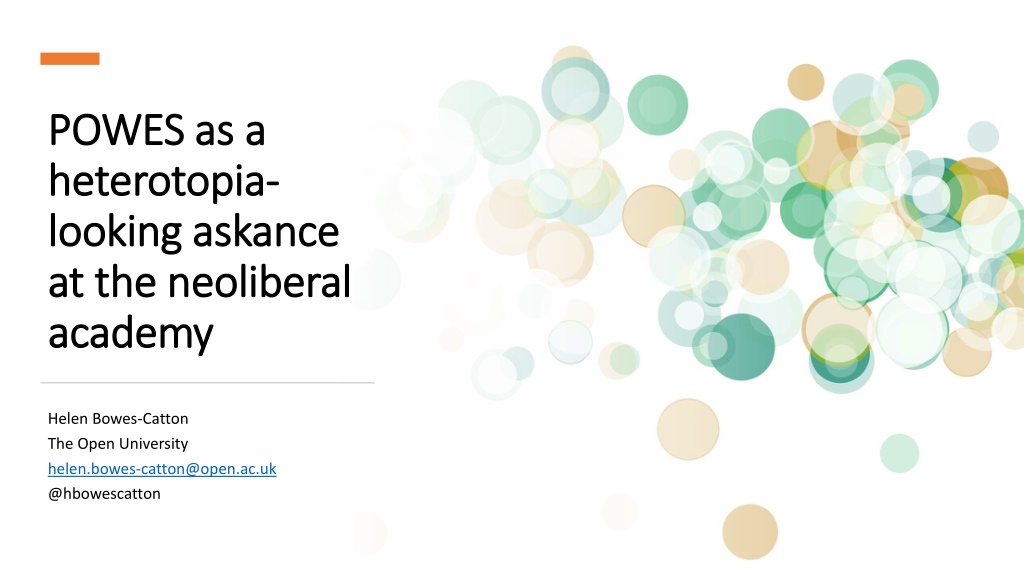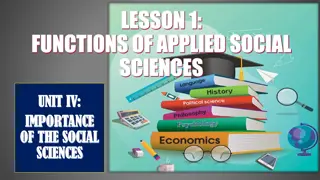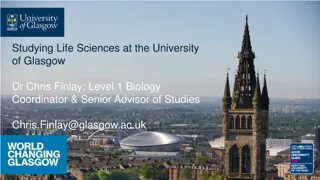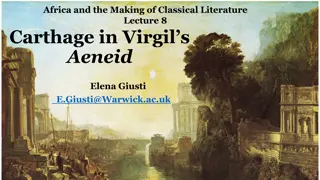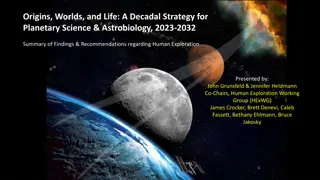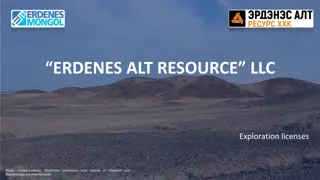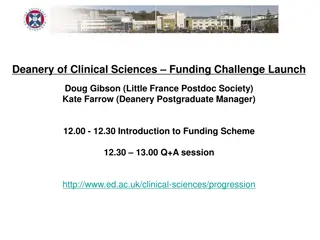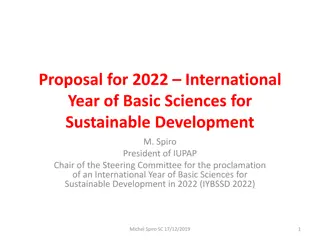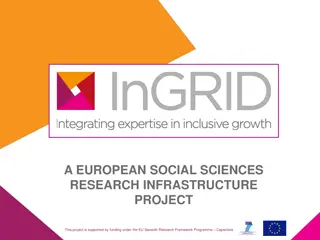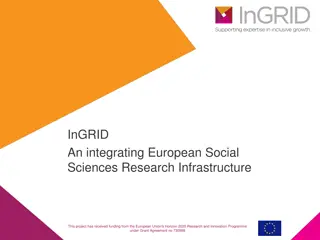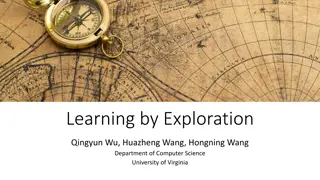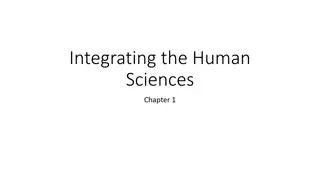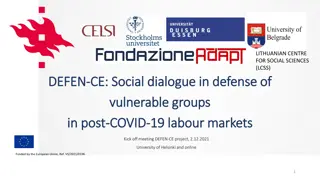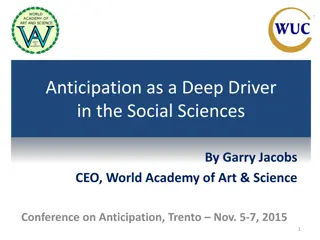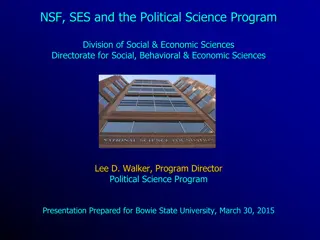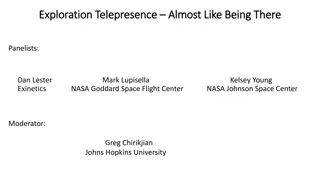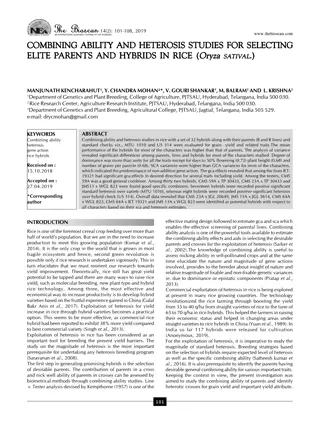Exploration of Heterotopias in Social Sciences
Spatial turn in social sciences emphasizes spaces as events shaped by time and motion, entrenched in power dynamics. Heterotopias offer spaces for utopian expressions and resistance, yet are still tethered to existing power relations. BiCon and naturist spaces exemplify heterotopias that allow participants to experience alternative subjectivities, challenging societal norms while reflecting and reproducing social orders.
Download Presentation

Please find below an Image/Link to download the presentation.
The content on the website is provided AS IS for your information and personal use only. It may not be sold, licensed, or shared on other websites without obtaining consent from the author. Download presentation by click this link. If you encounter any issues during the download, it is possible that the publisher has removed the file from their server.
E N D
Presentation Transcript
POWES as a POWES as a heterotopia heterotopia- - looking askance looking askance at the neoliberal at the neoliberal academy academy Helen Bowes-Catton The Open University helen.bowes-catton@open.ac.uk @hbowescatton
POWES moments? POWES moments? What makes you think Now I m at POWES ?
Heterotopias and place-events Spatial turn in the social sciences. Shift towards seeing spaces not just as physical locations but as events, produced by time and motion (Massey, 2005; Pink, 2012) And therefore as situated within multiple and contested power relations (Hetherington, 1997; Murdoch, 2006) Place-events intersubjectively constituted via the practices and movements of constituents (Pink, 2012) Heterotopias spaces outside of the world (Foucault, 1986) utopian desires for a differently-ordered world can be expressed but still related to the world- still embedded within power relations places of resistance but also reproduction
BiCon as a heterotopic place-event (Bowes- Catton, 2021) Participants experienced bi subjectivity as contested in daily life Participants described BiCon as taking place in a separate world , a portable bubble reached via a symbolic journey away from the everyday. Characterised by BiCon moments Within this magical space , participants could- recognise themselves and each other as present-tense bisexual subjects let off steam in a carnivalesque way try out new ways of being in the world, gather resources to take back to real life However, BiCon remained situated within the power relations of the outside world most comfortable for white, middle class, university-educated people community mythology of openness and diversity but constituted against a classed and racialised imagined Other it both reimagines and reproduces the existing social order
Naturist spaces (West and Bowes-Catton, 2016) Individual benefits of naturism Naturist moments of embodied pleasure Social benefits of naturism Naturism as an imagined community Naturism as both social leveller (naked= stripped of class and status) and social filter ( like- minded people ) However, naturist spaces remained situated within the power relations of the outside world most comfortable for white, middle class people community mythology of openness and diversity but constituted against a classed and racialised imagined Other it both reimagines and reproduces the existing social order
Conferences as heterotopic place-events Khoo et al (2021) (following Ahmed)- conferences as liminal spaces from within which we can look askance at the neoliberal academy: Conferences open up questions about the borders between the personal and the impersonal, proximity and distance, connection and disconnection, being there and not being there Conferences are liminal, extra-institutional spaces which are both of and beyond the university Conferences are spaces where academic structures are reproduced and even exaggerated Conferences are important spaces for knowledge fields that are marginalised in university departments How conferences are located in power relations - conference fatigue and conference moments
POWES a heterotopic place-event? What might we learn by thinking of POWES as a heterotopic place-event? What is a POWES moment and what does this tell us about POWES? What community mythologies do we have and what are their effects? Is POWES constituted against imagined others? How does POWES re-imagine the neoliberal university? How does it reproduce it?
A collective, critical auto-ethnography of POWES? helen.bowes-catton@open.ac.uk
References Bowes-Catton, H. (2021) This magical place : Understanding BiCon 2008 as a heterotopic place-event. Sexualities, 24(7), 851 873. https://doi.org/10.1177/13634607211035111 Bowes-Catton, H., Brewis, J., Clarke, C., Drake D.H., Gilmour A., Penn A. (2021) Talkin bout a revolution? From quiescence to resistance in the contemporary university. Management Learning 51 (4), 378- 397 https://journals.sagepub.com/doi/pdf/10.1177/1350507620925633 Foucault M. (1986) Of other spaces. Diacritics 16(1): 22 27. Hetherington, K. (1997) The Badlands of Modernity: Heterotopia and Social Ordering. London, UK: Routledge. Khoo, T., Burford, J., Henderson, E., Liu, H. & Nicolazzo, Z. (2021) Not Getting Over It: The Impact of Sara Ahmed s Work within Critical University Studies, Journal of Intercultural Studies, 42:1, 84-98, DOI: 10.1080/07256868.2020.1859209 Massey, D. (2005) For Space. London, UK: Sage Publications. Murdoch, J. (2006) Post-Structuralist Geography. London, UK: SAGE.Pink S (2012) Situating Everyday Life. London, UK: Sage. West, K., Bowes-Catton H. (2016) The naked truth? A large-scale qualitative investigation of experiences of naturism . Paper presented at the Annual Conference of the British Psychological Society Social Psychology Section, Cardiff, September 2016.
